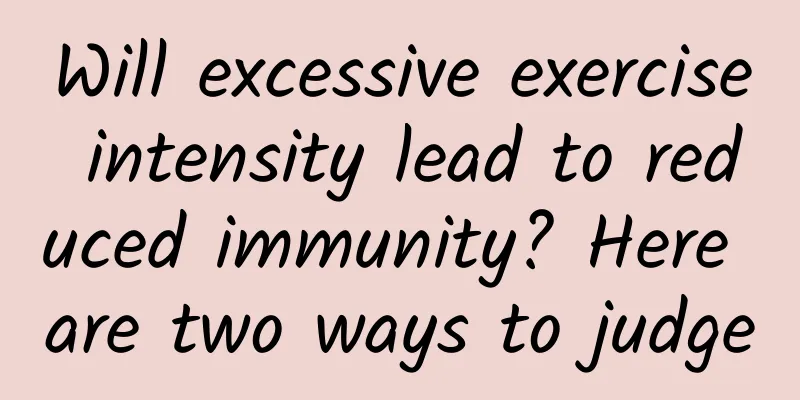Will excessive exercise intensity lead to reduced immunity? Here are two ways to judge

|
Have you ever had this experience: you exercise on a whim, but after you finish, you have symptoms such as sore throat, headache, runny nose, cough, etc.? After a sudden high-intensity exercise, people sometimes experience upper respiratory tract discomfort or infection. This is the "window theory" of reduced immunity after high-intensity exercise. A large number of studies have shown that high-intensity exercise for more than 90 minutes can reduce the immunity of exercisers by 15% to 70%. Why does immunity temporarily decrease after high-intensity exercise? Studies have found that high-intensity, long-term exercise can inhibit the function of many immune cells in the body, reduce the cytotoxic effect of natural killer cells in the blood, impair neutrophil function, and reduce the counts of lymphocytes and monocytes. From the perspective of immune cell apoptosis, the apoptosis rate of peripheral blood lymphocytes will increase significantly after exercise, and the abnormal increase or decrease of immune cell apoptosis may have adverse effects on the body, so there is a short "window period" of susceptibility to disease invasion. High-intensity exercise can reduce immunity. Should we still exercise? The answer is yes. Although high-intensity exercise can reduce our immunity in the short term, if we maintain a moderate amount of exercise over a long period of time, it can effectively improve the body's immunity. This is a process of "suppressing before promoting". Studies have shown that regular moderate-intensity exercise can increase the number of many important immune cells in the peripheral blood, enhance their functions, and improve their ability to clear viruses. At the same time, the number of anti-inflammatory factors produced increases, and the expression of anti-inflammatory genes is upregulated, thereby increasing the body's immune function. Other studies have shown that moderate exercise can also stimulate the release of stem cells with strong regenerative potential from the bone marrow into the blood, fundamentally enhancing the body's immunity. In daily life, how can we exercise to stay healthy? Regular long-term moderate-intensity aerobic exercise can effectively improve cardiopulmonary endurance, thereby improving human immunity. So, how should we judge whether aerobic exercise has reached moderate intensity? We can use heart rate, subjective effort and subjective feeling. The heart rate calculation formula can be calculated using the heart rate reserve method. First calculate the maximum heart rate = 207-0.7*age; then calculate the resting heart rate. Strictly speaking, the morning pulse should be used, but if you don't have the habit of recording your morning pulse, you can rest for 10 minutes before exercise and record your heart rate for 1 minute as a substitute; and the heart rate reserve = maximum heart rate - resting heart rate. The heart rate reserve means how much space there is to reach the body's extreme state from a resting state. The heart rate formula for moderate-intensity exercise using the heart rate reserve method = (40%~60%) heart rate reserve + resting heart rate. In addition, whether an aerobic exercise is of moderate intensity also needs to be determined based on subjective feelings. The subjective effort rating scale can be used to judge, and scores between 12 and 14 are of moderate intensity. The more recommended forms of aerobic exercise include: continuous sit-ups transitioning to squats, jumping jacks, burpees, etc., and achieving moderate intensity by adjusting the exercise frequency and range of motion. Subjective effort rating scale Source: Beijing Sport University Beijing Sport Media Expert interviewed: Li Xuemei, teacher of the Sports Medicine Teaching and Research Section, School of Sports Medicine and Rehabilitation, Beijing Sport University This article was scientifically reviewed by Professor Wang Zhengzhen of Beijing Sport University. |
<<: What is the difference between black dates and black dates? How to clean black dates?
>>: “Choose ingredients according to your needs” to see which Laba porridge is suitable for you?
Recommend
The noise is too loud~How to reduce noise with headphones? Are noise-cancelling headphones good?
The symphony of the city is not always pleasant t...
When an online self-assessment scale shows "severe depression", how should ordinary people respond?
There are many self-rating depression scales on t...
Can I detect pregnancy 14 days after sex?
The first thing women need to understand is that ...
How to correctly deal with milk engorgement during weaning period?
After giving birth, female stars will start breas...
How many menstrual periods are normal in a year?
We all know that when women enter puberty, becaus...
Upper back pain in early pregnancy
After pregnancy, women's physiological change...
Girls right breast pain
There are many reasons for chest pain in girls. G...
How to detect ovulation during irregular menstruation
We all know that women release an egg every month...
Why is there some black blood three days after my period?
A woman's menstruation usually lasts 3 to 7 d...
No menstruation after 30 days of abortion
Some women will choose to use artificial abortion...
Check out the top 5 Chinese patent medicines for stomach health, essential for stomach health!
Nowadays, the incidence of stomach diseases is ge...
What should I do if there is still some left after the drug abortion?
The duration of medical abortion should be contro...
I still have blood four days after the abortion.
Bleeding after an abortion is a relatively normal...
What are the benefits of eating figs for women? How to choose figs
For women, the biggest benefit of eating figs is ...
People who have these 5 habits are very likely to be targeted by kidney stones! Many people have been "hit" by the first type...
Stones are a very strange existence in the human ...









